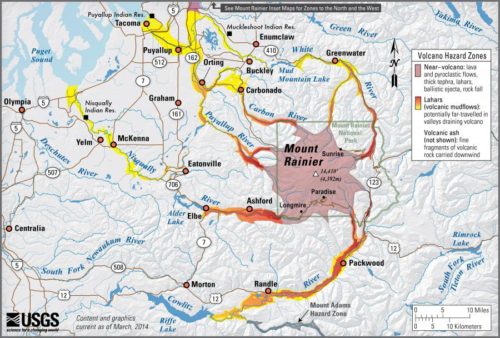SUBSCRIBE TO THE FREE NEWSLETTER
Alaska and Idaho voters to decide on salmon, health care
It’s election time in Cascadia, and today we look at two measures in Idaho and Alaska.
Idaho has a reputation as being conservative-minded, and indeed, all of its delegation to the US Congress, both houses of its legislature, and the governor’s office are held by Republicans. So it’s surprising to see the success of an initiative on the ballot this November that would expand Idaho’s participation in the federal Medicaid program.
During the Obama years, Washington and Oregon expanded access to Medicaid, but Idaho chose not to participate. That could change with passage of Prop 2, which would add more than 60,000 Idahoans to a program funded 90 percent by the federal government.
The effort has an unlikely leader: a Republican state legislator who owns a gun store in Boise: Christy Perry. NPR reports on her two-year effort to increase health care access for low-income people in Idaho. The Idaho Medical Association has come out in support of the measure.
And in Alaska, voters will decide whether to increase protections for salmon habitat. Measure 1 would require major resource extraction projects to be subject to environmental review and public comment. Environmentalists and the salmon fishing industry are supportive, while mining and logging companies are opposed. 58 scientists and wildlife managers recently signed a letter of support for the measure.
Cascadia Magazine original: “Trudeau”
Now online at Cascadia Magazine, read Rob Lewis’s poem “Trudeau,” in which the Canadian prime minister — who seemed to have such great promise– turns out to have a strange addiction for petroleum in pipelines…
“No one noticed,
not even him, the black speck
at the corner of his smile.
It began to spread, creeping across his lips
like an oil-bled kiss.” Read more here.
Washington may become first state with a carbon fee
Washington’s initiative 1631, which would put a $15 fee on every ton of carbon, is getting national attention with a story today in the New York Times examining what would be the first statewide carbon fee in the US. All that attention is drawing big money: it’s now the most expensive initiative campaign in state history. According to a story at the Inlander, the No On 1631 campaign has received over $26 million from fossil fuel industries. Meanwhile, writing for the Georgia Straight, David Suzuki wonders if British Columbia has given up on fighting climate change.
Under pressure, Oregon governor releases school rankings
After controversy erupted when the head of Oregon’s school system said he would wait until after the governor’s election to release performance ratings on all public schools, the director and governor Kate Brown reversed course and released them. Oregon Live has a full searchable database of the report here. Brown is also under fire for only agreeing to release proposed legislation for the next session after a court ordered her adminstration to.
New report stresses danger posed by Cascadia volcanoes
The Seattle Times reports on a new study from the US Geological Survey that looks at threats to human populations from volcanoes in the US — and Mount St. Helens and Mount Rainier in Washington are near the top of the list. The report didn’t cover Canada, so British Columbia, which has 18 dormant volcanoes (including Mount Garibaldi and Mount Meager) wasn’t included in the study. In related news, the UW Daily reports that the Pacific Northwest Seismic Network is upgrading its regional earthquake reporting system. And to prepare for an imminent Cascadia subduction zone earthquake, Cascadia Prepared is a new organization working to get people ready for the Big One.
#MeToo movement takes hold in BC First Nations communities
CBC reports on how the #MeToo movement calling attention to sexual assault and harassment is growing among women in British Columbia First Nations, where rates of assault are over 11 times the rest of the population. Meanwhile, Lilly Fowler, writing for Crosscut, reports on the disturbing case of a young woman from Issaquah, Washington who was raped, and then subjected to harassment by students, parents and faculty for reporting the crime, committed by two star high school football players.
Growth in handmade culture on BC’s coast
The Tyee has an interesting feature on a growing movement of artisans in British Columbia’s Gulf Islands–everything from bakeries to jewelry. On Gabriola Island, “creative labor” accounts for a majority of the island’s income.
The legacy of Vancouver poet & photographer Jim Wong-Chu
Over at Ricepaper, you can read Allan Cho’s lovely essay recalling the influence of Jim Wong-Chu, a groundbreaking Vancouver poet and photographer who worked tirelessly to promote and encourage Asian Canadian writers. The piece includes a poem from Chinatown Ghosts, a new collection Wong-Chu’s verse and photos published by Arsenal Pulp:
“I am a miner of the mountain of gambler’s gold
between bowls of borrowed rice”
On blurring fiction and nonfiction–an essay by Michelle Bailat-Jones
Over at LitHub, there’s a sharp essay addressing the tricky question of “how much of your novel is autobiographical?” by Michelle Bailat-Jones, a novelist and translator who’s from Seattle but lives and works in Switzerland. Her new novel, Unfurled, is set in the Pacific Northwest and explores how a family deals with a mother’s struggle with mental illness.
That’s today’s collection of news, arts, and culture from across the Cascadia bioregion. Have a great weekend! –Andrew Engelson
Photo credits: potential flooding from Mount Rainier eruption by USGS (public domain)

